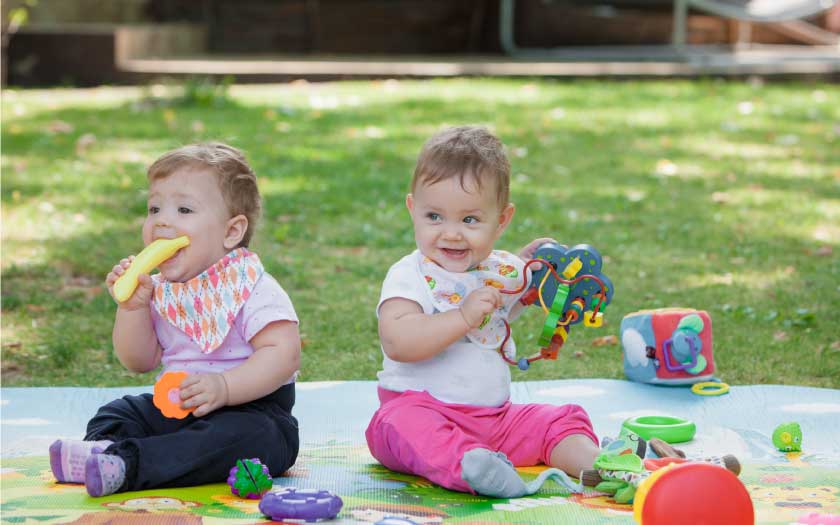Your baby’s growth and development during the first 12 months is a joy to witness for so much happens within that short period! As a parent, you’ll want to know if something is amiss.
Babies all grow and develop at very different rates and it’s hard to say what will happen next. They might be developing as expected, or be way ahead of others or even lagging. As long as your little one eats and sleeps well, has an interest in his or her environment, and is keen on trying to move about, all should be going well.

Basic developmental milestones
Developmental achievements are called ‘milestones’. The basic growth and development milestones below are a useful guide for tracking your baby’s development, but they aren’t something to get too worried about.
Developmental milestones are grouped under headings according to the parts of the body they refer to:
- Large body movements (gross motor skills) involve the coordination and control of large muscles, and skills like walking, sitting, and running.
- Small body movements (fine motor skills) involve the coordination and control of small muscles, and skills like holding a rattle, picking up crumbs, and scribbling with a pencil.
- Vision is the ability to see near and far.
- Hearing is the ability to hear, listen to, and interpret sounds.
- Speech is the ability to produce sounds that form words.
- Social behaviour and understanding is the ability to learn and interact with others. It includes skills for play and connecting and communicating.
Developmental delay
Some babies have delays in their development. These delays might be short term or permanent, but permanent delays don’t happen often.
Premature birth and illness are two things that might cause temporary delays. Some disabilities however can cause a permanent delay.
Babies’ development can also be affected by their environment and the people around them. For example, they don’t have warm relationships with their primary carers, or if there are no predictable routines to help them feel safe, or if their parents practice substance abuse — all these can affect a little one’s development.
Signs to watch out for
If you notice any of the following in your baby, mention it to your doctor.
Physical
Your baby:
- has white or cloudy pupils, or there’s something about his eyes that bothers you
- doesn’t move or use both arms and/or legs
- can’t hold his head up by the time he’s reached 3–4 months
- isn’t sitting well by 10 months
- doesn’t want to bear his weight by 12 months
Behaviour
Your baby:
- doesn’t consistently respond to sounds
- is persistently crying for more than three hours a day, especially after 3–4 months (it’s normal for babies to cry for about two hours a day, with cries peaking at 6–8 weeks)
- has a high pitched squeal instead of a normal cry
Social, emotional and communication
Your baby:
- doesn’t look at you
- isn’t interested in what’s going on around him
- isn’t babbling by 9 months or is using fewer than 5 words at 18 months
If however, your baby seems slow to do some things compared to other babies, it’s probably not something to worry about. Try to resist the temptation to compare your baby with others, because this can cause you to worry when you don’t need to. Comparing your baby to others can even have a negative impact on your relationship with your child in the long run too.


